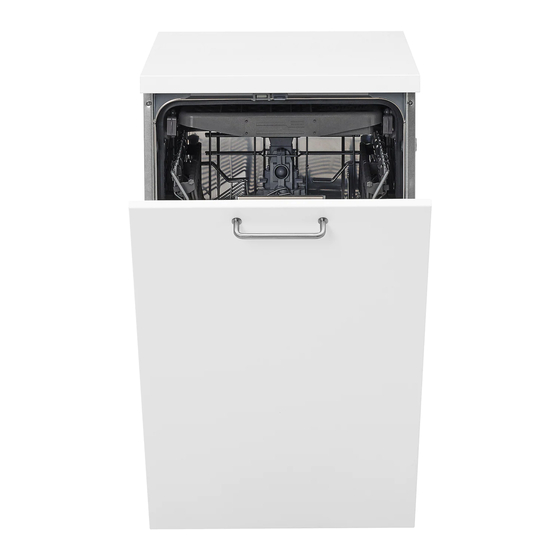IKEA BDW FINP 450 NE Manual de instrucciones - Página 21
Navegue en línea o descargue pdf Manual de instrucciones para Lavavajillas IKEA BDW FINP 450 NE. IKEA BDW FINP 450 NE 36 páginas.

ENGLISH
part of the appliance unless specifically
stated in the user manual. Keep children
away from the installation site. After
unpacking the appliance, make sure that it
has not been damaged during transport. In
the event of problems, contact the dealer
or your nearest After-sales Service.
Product to be transported in the original
packaging and stored indoors in a dry
place.
Once installed, packaging waste (plastic,
styrofoam parts etc.) must be stored out
of reach of children - risk of suffocation.
The appliance must be disconnected from
the power supply before any installation
operation - risk of electrical shock. During
installation, make sure the appliance does
not damage the power cable - risk of fire or
electrical shock. Only activate the appliance
when the installation has been completed.
Connect the dishwasher to the water mains
using only new hose sets. The old hose sets
should not be reused.
All hoses must be securely clamped
to prevent them coming loose during
operation.
All local waterboard regulations must be
complied with. Water supply pressure
0.05 - 1.0 MPa.
The appliance must be placed against
the wall or built into furniture to limit the
access to its rearside.
For dishwashers having ventilation
openings in the base, the openings must
not be obstructed by a carpet.
If installing the dishwasher at the end
of a row of units making the side panel
accessible, the hinge area must be covered
to avoid risk of injury.
The inlet water temperature depends on
the dishwasher model. If the installed inlet
hose is marked "25°C Max", the maximum
allowed water temperature is 25°C. For all
other models the maximum allowed water
temperature is 60°C. Do not cut hoses
and, in the case of appliances fitted with
a waterstop system, do not immerse the
plastic casing containing the inlet hose
in water. If hoses are not long enough,
contact your local dealer. Make sure the
inlet and drain hoses are kink-free and are
not crushed. Before using the applinace
for the first time, check the water inlet and
drain hose for leaks. Make sure that the
four feet are stable and resting on the floor,
adjusting them as required, and check that
the dishwasher is perfectly levelled using a
spirit level.
Use the appliance only when the covers
shown on diagram 19 in the installation
booklet are correctly assembled - risk of
injury.
ELECTRICAL WARNINGS
The rating plate is on the edge of the
dishwasher door (visible when the door is
open).
It must be possible to disconnect
the appliance from the power supply by
unplugging it if plug is accessible, or by
a multi-pole switch installed upstream of
the socket in accordance with the wiring
rules and the appliance must be earthed in
conformity with national electrical safety
standards.
Do not use extension leads, multiple
sockets or adapters. The electrical
components must not be accessible to
the user after installation. Do not use the
appliance when you are wet or barefoot.
Do not operate this appliance if it has a
damaged power cable or plug, if it is not
working properly, or if it has been damaged
or dropped.
If the supply cord is damaged, it must
be replaced with an identical one by the
manufacturer, its service agent or similarly
qualified persons in order to avoid a hazard
- risk of electrical shock.
If the fitted plug is not suitable for your
socket outlet, contact a qualified technician.
Do not pull the power supply cable. Do not
immerse the mains cord or plug in water.
Keep the cord away from hot surfaces.
CLEANING AND MAINTENANCE
WARNING: Ensure that the appliance
is switched off and disconnected from
the power supply before performing
any maintenance operation - risk of
electrical shock. Never use steam cleaning
equipment
Do not repair or replace any part of the
appliance unless specifically stated in the
user manual. Use only authorized After-
sales Service. Self or non-professional
repair may lead to dangerous incident
resulting in live or health threatening and/
or significant property damage.
21
